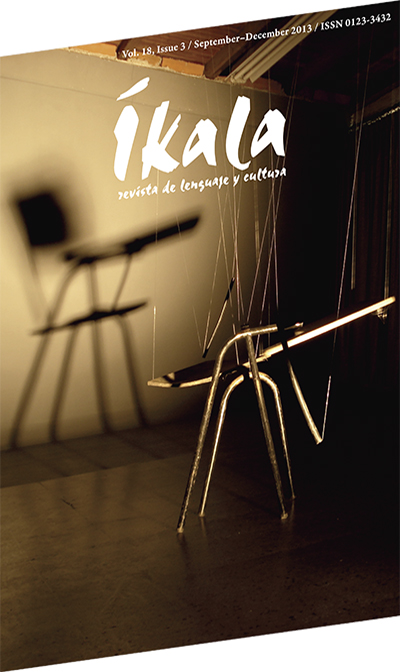Exigencias Cognitivas y el Escritor de Inglés como Lengua Extranjera: Observaciones sobre Tipo, Nivel, y Autonomía
DOI:
https://doi.org/10.17533/udea.ikala.16040Palabras clave:
teoría de proceso dual, proceso de redacción, redacción en inglés como lengua extranjeraResumen
Investigaciones que buscan comprender el proceso mediante el cual los escritores EFL enfocan la revisión de sus textos en cuestiones de grado: de capacidad cognitiva y complejidad o volumen de tareas. Este ensayo explora algunos de los nexos entre dual process theories y composición en EFL para argumentar qué tipo de temas pueden ser de igual pertinencia. Su objetivo es demostrar que el tipo de procesos cognitivos relacionados con la etapa de revisión, con frecuencia, definen qué tipo de información se procesa, de qué manera se hace, y posteriormente, cómo se siente el escritor frente a sus decisiones.
Descargas
Citas
Bloodgood, J. (2002). Quintilian: A classical educator speaks to the writing process. Reading Research and Instruction, 42(1), 30–43.
Chapman, L. J., & Chapman, J. P. (1982). Tests results are what you think they are. In D. Kahneman, P. Slovic, & A. Tversky, (Eds.), Judgment under uncertainty: Heuristics and biases (pp. 239–248) New York, NY: Cambridge University Press.
Connor, U., & Farmer, M. (1990). The teaching of topical structure analysis as a revision strategy for ESL writers. In B. Kroll (Ed.), Second language writing: Research insights for the classroom (pp. 126–139). New York, NY: Addison-Wesley.
Erickson, T., & Mattson, M. (1981). From words to meaning: A semantic illusion. Journal of Verbal Learning and Verbal Behavior, 20, 540–551.
Flower, L., & Hayes, R. (1981). A cognitive process theory of writing. College Composition and Communication, 32, 365–387.
Gilbert, D. (1991). How mental systems believe. American Psychologist, 46(2), 107–119.
Gómez, R., Parker, R., Lara-Alecio, R., & Gómez, L. (1996). Process versus product writing with limited English proficient students. The Bilingual Research Journal, 20, 209–233.
Graham, S. (2008). Strategy instruction and the teaching of writing: A meta-analysis. In C. MacArthur, S. Graham, & J. Fitzgerald, (Eds.), Handbook of writing research (pp.187–207). New York, NY: The Guilford Press.
Hayes, J. (2004). What Triggers Revision? In L. Allal, L. Chanquoy, & P. Largy (Eds.), Revision: cognitive and instructional processes (pp. 9–20). Norwell, MA: Kluwer.
Hillocks, G. (1986). Research on written composition. Illinois, IL: ERIC Clearinghouse on Reading and Communication Skills.
Hume, D. (2007). An enquiry concerning human understanding and other writings. London, United Kingdom: Cambridge University Press.
Kahneman, D. (2011). Thinking, fast and slow. New York, NY: Ferrar, Straus, and Giroux.
Kellogg, R. (1988). Attentional overload and writing performance: Effects of rough draft and outline strategies. Journal of Experimental Psychology: Learning, Memory, and Cognition, 14, 355–365.
Kellogg, R. (1996). A model of working memory in writing. In C. M. Levy & S. Ransdell (Eds.), The science of writing, theories, methods, individual differences, and applications (pp. 57–71) Mahwah, NJ: Erlbaum.
Kellogg, R. (2001). Long term-working memory in text production. Memory and Cognition, 29(1), 43–52.
Kroll, B. (Ed.). (1990). Second language writing: Research insights for the classroom. New York, NY: Cambridge University Press.
Johns, A. (1986). Coherence and academic writing: some definitions and suggestions for teaching. TESOL Quarterly, 20, 247–266.
Jones, C. S., & Tetroe, J. (1987). Composing in second language. In A. Matsuhashi (Ed.), Writing in real time (pp. 34–57). New York, NY: Addison-Wesley.
Liebman-Kleine, J. (1986). In defense of teaching process in ESL composition. TESOL Quarterly, 20, 783–788.
Mendonca, C., & Johnson, K. (1994). Peer review negotiations: Revision activities in ESL writing instruction, TESOL Quarterly, 28, 745–769.
National Writing Project. (2012). History of NWP. National Writing Project. Retrieved from http://www.nwp.org/cs/public/print/doc/about/history.csp
Olive, T., & Piolat, A. (2002). Suppressing visual feedback in written composition: Effects on processing demands and coordination of the writing process. International Journal of Psychology, 37(4), 209–218.
Polya, G. (1957). How to solve it. Princeton, NJ: Princeton University Press.
Reid, J. (1989). English as a second language composition in higher education: The expectations of the academic audience. In D. Johnson and D. Roen (Eds.), Richness in writing: Empowering ESL students (pp. 220–234). New York, NY: Longman.
Rijlaarsdam, G., & Van den Bergh, H. (2008). Writing process theory: A functional dynamic approach. In C. MacArthur, S. Graham, & J. Fitzgerald, (Eds.), Handbook of writing research (pp. 41– 53). New York, NY: The Guilford Press.
Silva, T. (1990). Second language composition instruction: Developments, issues, and directions in ESL. In B. Kroll (Ed.), Second language writing: Research insights for the classroom (pp. 11–23). New York, NY: Addison-Wesley.
Slovic, P., Finucane, M., Peters, E., & Mac Gregor, D. (2002). The affect heuristic. In T. Gilovich, D. Griffin, & D. Kahneman, (Eds.), Heuristics and biases: The psychology of intuitive judgment (pp. 397–420). New York, NY: Cambridge University Press.
Spack, R. (1984). Invention strategies and the ESL college composition student. TESOL Quarterly, 18, 649–670.
Surowiecki, J. (2004). The wisdom of crowds. New York, NY: Random House.
Torrence, M., & Galbraith, D. (2008). The processing demands of writing. In C. MacArthur, S. Graham, & J. Fitzgerald, (Eds.), Handbook of writing research (pp. 67–80). New York, NY: The Guilford Press.
Zamel, V. (1976). Teaching composition in the ESL classroom: What we can learn from research in the teaching of English. TESOL Quarterly, 10, 67–76.
Descargas
Publicado
Cómo citar
Número
Sección
Licencia
Derechos de autor 2013 Íkala, Revista de Lenguaje Y Cultura

Esta obra está bajo una licencia internacional Creative Commons Atribución-NoComercial-CompartirIgual 4.0.












